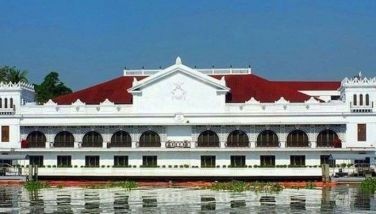A thousand days
On Thursday, March 27, 2025, Ferdinand “Bongbong” Romualdez Marcos Jr. quietly marked his 1,000th day in office as president of the Philippines.
The milestone was celebrated with a remarkable lack of frill and flourish. The Department of Housing put out a press release of President BBM visiting a high-rise housing in Bocaue, Bulacan.
In his first State of the Nation Address, BBM promised to build six million homes in six years, or one million units per year. It was an outlandish pledge, matched only by his campaign pledge of a P20 kilo rice. Alas, both promises cannot be fulfilled. The entire housing industry can deliver only 200,000 units a year. The cost of rice when you buy it at the farm is already P20 per kilo. Bad roads, bad logistics and bad speculators bring that up to a minimum of P50 at retail. So now Agriculture Secretary Francis Tiu Laurel targets a more realistic retail price of P45 per kilo.
In America, the first 1,000 days of the presidency were immortalized in a book by Harvard historian Arthur Schlesinger Jr., who wrote the prize-winning “A Thousand Days” of President John F. Kennedy.
Said The New York Times of JFK’s book in 1965: “Schlesinger has caught both the sweep and the ferment of the thousand days. He has chronicled Kennedy’s long and skillful nomination campaign, the battle with Nixon, the feverish preparations for office, the scintillating inaugural days and then the burdens of power – Latin America, Berlin, Southeast Asia, Africa and always Moscow and Peking; and at home, economic recovery, the civil rights revolution and the fight with Big Steel, and all the rest. Nor does he ignore the disappointments – burning humiliation after the Bay of Pigs, the frustrations on Capitol Hill and the immovability – as Schlesinger sees it – of the bureaucracy in general and of the State Department very much in particular.”
In his first 1,000 days, JFK established the Peace Corps, enshrined civil rights for Blacks, signed the first nuclear pact, challenged the Soviets in Berlin, removed Soviet missiles in Cuba and inspired Americans about the power and idealism of America. Of course, JFK tried to break up Big Business, failed to invade Cuba and failed to kill Fidel Castro. Those failures ultimately contributed to his assassination, which assassination turned him into a national hero, etched in the memory of every American forever.
During BBM’s 1,000 days, here are some of what history and historians might want to remember:
1. The first president to export for incarceration and trial for crime against humanity a former president, Rodrigo Roa Duterte, his predecessor. This act renders immediately justice to the victims of extrajudicial killings, estimated at between 12,000 and 30,000, during Duterte’s reign as long-time mayor of Davao and as president for six years.
Duterte’s arrest also shows that impunity has its day of reckoning. Duterte is also the first Asian head of state to be arrested by the International Criminal Court and face trial for crimes against humanity. Hopefully, Duterte, 80, would last the length of his trial, three to 10 years, long enough to face conviction. If Digong dies before his conviction (assuming he is indeed guilty), his body will be returned home to the Philippines a hero and given a hero’s burial.
2. BBM is the first president since 1991 when the Senate rejected the renewal of the bases treaty to welcome the return of the military facilities (numbering nine to 12 nationwide) for use by US forces. America’s forward base in the Philippines rebalances the security structure in the Indo-Pacific, which covers roughly half the Earth’s surface and is home to 4.7 billion people. American forces are back in the Philippines, with their missiles and other weapons of mass destruction.
3. BBM is the first president to destroy in such a short time one of the most powerful political dynasties in the Philippines, first by the police arresting its patriarch for trial abroad and second, by exposing the unmitigated corruption and abuse of power of the dynasty’s would-be successor, thanks to high-profile months of investigations by Congress.
4. BBM united the country. For the first time in over half a century, or since Ferdinand Edralin Marcos in 1969, a president has been elected with a majority vote of the people.
Except in Bicol and Western Visayas, BBM won in 2022 by large majorities, garnering 31.6 million votes – the largest vote by any president and the largest margin ever by a winning president over his nearest opponent.
5. BBM reconnected the Philippines to the world. He stopped the pivot to China, strengthened ties with old ally the US, dealt substantially with Europe, while maintaining close and solid relations with old partners Japan, South Korea, Australia and the ASEAN.
BBM became one of world’s most popular leaders, with an approval rating at its 2023 peak of 82 percent, beating the over 76 percent of Narendra Modi of India. Basking in that popularity, BBM accordingly embarked on record-breaking foreign trips – one trip per month on average.
6. BBM is modernizing the economy, opening it up to new players and easing the rules of engagement to allow for a more competitive business environment, one that promotes efficiencies, lowers costs, promotes quality of products and services and is more inclusive.
The Philippine economy is one of the strongest, if not the strongest, in the 10-nation ASEAN
7. In financing the economic growth, for the first time, with BBM, an administration is pooling state funds, earnings and savings in a meaningful way, through the Maharlika Investment Fund.
8. Build, Build, More. BBM is keen to expand the country’s stock of infrastructure on a scale and vision never before seen, with annual infra spending exceeding P1 trillion or more than five percent of GDP.
* * *
Email: biznewsasia@gmail.com
- Latest
























